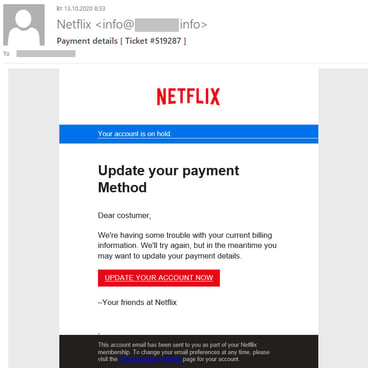Netflix is the Latest Impersonated Brand in Ongoing Subscriber Targeting Scams

With the increased interest in and availability of movie and TV streaming services, plenty of new scams are popping up attempting to steal personal details and credit card information.
This year, we’ve seen for the first time brand new movies being sent to both theaters AND direct to paid streaming services. It’s one of the reasons there is so much uptick in streaming service use. But, according to security researchers at Kaspersky, more streaming service-related scams are popping up, with Netflix in particular. We’ve seen Netflix top the charts of impersonated brands last year, and giving the rise in interest in streaming services this year, it makes sense that the Netflix brand is being misused for nefarious purposes. According to the article, scammers are using one of two themes to attract the attention of would-be victims:
- An opportunity to subscribe – using little more than a great deal as an incentive, scammers create realistic-looking landing pages used to capture victim’s personal and payment details, such as the one below.
Source: Kaspersky
- A payment issue with an existing account – Netflix users can be easily tricked with a “there was a problem with your payment method”-type of email (shown below), with the scam ending in the victim offering up their credit card details.

Source: Kaspersky
These attacks can just as easily use social engineering tactics that get victims to download and open PDF documents, Office documents, or malicious email attachments, making the use of the impersonated brand a particularly dangerous aspect of a phishing scam. With the brand known to the victim, defenses are down when interacting with the email received. Users need to be educated using Security Awareness Training to be vigilant when receiving emails from well-known brands they trust. Anything unexpected should be addresses with a dash of mistrust.
Free Phishing Security Test
Would your users fall for convincing phishing attacks? Take the first step now and find out before bad actors do. Plus, see how you stack up against your peers with phishing Industry Benchmarks. The Phish-prone percentage is usually higher than you expect and is great ammo to get budget.

Here’s how it works:
- Immediately start your test for up to 100 users (no need to talk to anyone)
- Select from 20+ languages and customize the phishing test template based on your environment
- Choose the landing page your users see after they click
- Show users which red flags they missed, or a 404 page
- Get a PDF emailed to you in 24 hours with your Phish-prone % and charts to share with management
- See how your organization compares to others in your industry
PS: Don’t like to click on redirected buttons? Cut & Paste this link in your browser: https://info.knowbe4.com/phishing-security-test-partner?partnerid=001a000001lWEoJAAW


